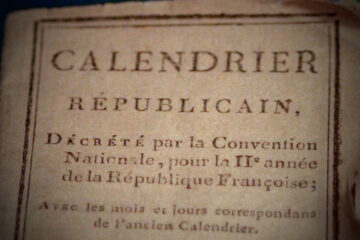Civil registers- NMD
The Civil Register, or Etat Civil contains the main vital records which are referred to as NMD, naissance, marriage, décès or Birth, Mariage and Death. The Civil Register begins in September 1792 with the birth of the French Republic. These records were held by the state rather than the Church and became the official documents. All acts must be recorded first at the Mairie, or Town Hall, where the civil register is recorded. Parish records became an option after the separation of State and Church.
The acts found in the civil register are organized differently in each commune. A generalized organization, however, would be Births, Marriages and then Death acts in that order. This is especially true towards the end of the 19th century. The earlier years of the Republic prove to be sometimes unorganized and difficult to go through as many were unschooled and learning to keep the documents accordingly.
Marginal notes
Marginal notes in the civil register are very important. These notes consist of the person’s marriage or death that have been transferred onto the birth act. These notes can be seen in the 1850 or 1860, although they are mostly rare during these decades. They are especially prominent after the 1870s. The process of transferring the marriage and death act took mostly in effect In the late 1890s and early 1900s. Sometimes other information
Decennial Tables- TD
A major advantage of searching for vital records in the 19th century is the usage of the Tables Décennales, or the Decennial Tables often noted as TD. These tables are generally organized in alphabetical order every ten years starting with the 3rd year of the Decennie and ending with the 2nd year of the following decennia; eg: 1833- 1842. The general order of the Tables is Birth, Mariage and Death; however the earlier years may sometimes begin with marriages. With the organization of the names, they may be organized by year, by first letter of the last name and then the date, or alphabetically regardless of the date.
Influence on the French Empire
Napoleon was notorious for wanting to spread the new democracy throughout Europe. As his Empire expanded into neighboring countries, such as Germany, Spain and Italy, so did the influence of the civil state registration. It is therefore not unusual to find French records in occupied areas during the Napoleaonic era, or the beginning of the 19th century, and we can appreciate this innovation for even the present day. Evidently, The civil state registration unified the records no matter the religion of the inidividual.

0 Comments